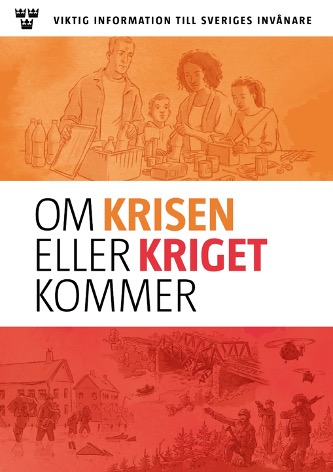
In May 2018, the Swedish government distributed a pamphlet entitled “If the Crisis or the War Comes” to 4.8 million households in Sweden. Both the pamphlet (pictured above) [1] and its distribution may be are unprecedented in the current era. The stated purpose of the pamphlet from the government’s perspective was “to help increase people’s knowledge about how to prepare themselves for various crises, elevated readiness, and, in the final extreme, war”[2]. The title was consciously chosen because of its association with the earlier pamphlet If War Comes, which had been distributed to Swedish households and summarized in telephone directories in the past. If War Comes was first published in 1943, with subsequent revisions appearing in 1952, 1961, 1983, and 1987. After the version in the late the communication on how to prepare and contribute during war situations was put to a halt, only to be reissued 30 years later. Sweden, which has not been at war for over 200 years all of sudden finds it necessary to ensure that all of its citizens are prepared for both crisis and war and are encouraged to stockpile water, food, and other necessities in order to care for their own and their close one’s security. The pamphlet and the Swedish approach to potential crisis and war became international news covered by well-known international media, including The New York Times and The Guardian
At a first glance, the pamphlet may seem to come out of the blue, and represent a return to traditional state security present during the Cold War era. Yet, if we follow the development in Sweden from the end of the Cold War it is clear that the pamphlet is part of wider discourse of building resilience as a way to cope with societal security challenges. In 2015, another layer was added to idea of resilience and responsible/prepared citizens, which includes a return to an interest in national security. This new and encompassing approach to crisis and war also entails radical shifts between Swedish crisis- and security management and the role ascribed to the population and individual citizens for sustaining and supporting the state and the society during hardships. Looking at the front page of the pamphlet we can see at the top how a family is ‘prepping’ food items in a box and at the bottom there is an image that potentially shows a natural disaster situation (flooding) and a war situation side by side, seamless in the same frame. In my article, “Resilience, Morality, and Solidarity in Sweden: Societal and National Security through Civil Preparedness” published with Security Dialogue, I offer a genealogical analysis of how the population and individual citizens are incorporated in the management of societal and national security that expands the notion of total defense beyond war situations and state of exceptions.
”The new normality is the preparation and resilience for future events.”
A key finding of the article is that citizens and their behavior becomes a focal point in the emerging societal security schema after the end of the Cold War in Sweden. However, as Sweden rediscovers the need for national defense and security, it merges societal and national security into a new total defense discourse. This discourse includes elements of societal security, resilience, and neoliberal governmentality, and places threats, crises, and wars on a single continuum. This reconfiguration shifts the state-citizen relationship with citizen-citizen relations in current security discourse it and dissolves war/peace and crisis/security distinctions. Thus, while war preparedness in previous eras was an exceptional aspect of human life and citizenship, the wider conception of security now evolving bind together societal and national security such that civil and war preparedness are merged into a dimension of everyday existence. The new normality is the preparation and resilience for future events.
The resulting new security approach and accompanying new image of an ideal citizen give rise to a moral dimension of security that resides upon and operates by means of voluntary actions, even though it is framed as constituted through solidarity with one’s fellow citizens. This development has implications for the social contract and follows from a logic of “better safe than sorry” that sustains expanding securitization, growing fear and growing social control to sustain societal resilience beyond the state.
[1] MSB (2018) ”If Crisis or War Comes” Pamphlet.
[2] The Swedish Government 2017 Uppdrag till MSB att öka människors kunskap om förberedelser inför kriser och höjd beredskap. Stockholm: Regeringskansliet, Justitiedepartementet.